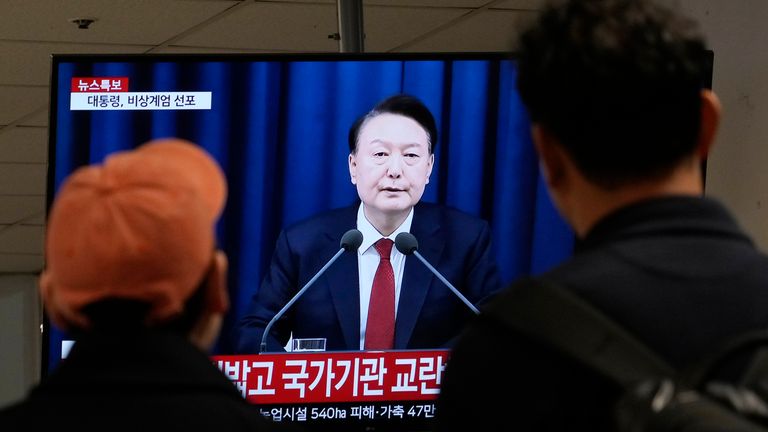South Korean lawmakers have called for the impeachment of the president after he declared martial law only to reverse the move hours later, triggering the biggest political crisis the country has faced in decades.
The surprise declaration late on Tuesday ignited a standoff with parliament which rejected President Yoon Suk Yeol’s attempt to ban political activity and censor the media.
After his earlier shock announcement, troops had entered the National Assembly building as police and protesters clashed outside. Lawmakers at one point used fire extinguishers to prevent troops from entering parliament.
The Swedish prime minister announced on Wednesday he has postponed his scheduled visit to South Korea this week.
Ulf Kristersson had been scheduled to hold a summit meeting with Mr Yoon.
A coalition of lawmakers from opposition parties said they planned to propose a bill to impeach Mr Yoon on Wednesday, which should be voted on within 72 hours.
“The parliament should focus on immediately suspending the president’s business to pass an impeachment bill soonest,” Hwang Un-ha, an MP in the coalition, told reporters.
Mr Yoon told the nation in a TV address that martial law was needed to defend the country from nuclear-armed North Korea and pro-North anti-state forces, and protect its free constitutional order, although he cited no specific threats.
Within hours, South Korea’s parliament, with 190 of its 300 members present, unanimously passed a motion requiring martial law be lifted, including all 18 members present from the president’s party.
The president then rescinded the declaration.
Why was martial law declared in South Korea?
Protesters outside the National Assembly parliament shouted and clapped, chanting “we won”.
South Korea’s largest union coalition, the Korean Confederation of Trade Unions, said thousands of its members would strike until Mr Yoon resigned and will hold a rally in Seoul.
Several other protests are expected, including near the National Assembly where thousands of people gathered late on Tuesday to call to block Mr Yoon’s order – and then demand his arrest and resignation.
South Korean stocks opened down around 2% on Wednesday, while the won steadied to trade around 1,418 to the dollar, having plunged to a two-year low.
‘He cannot avoid treason charges’
The main opposition Democratic Party (DP) has called for Mr Yoon, who has been in office for two years, to resign or face impeachment.
“Even if martial law is lifted, he cannot avoid treason charges,” a senior DP member of parliament, Park Chan-dae, said.
“It was clearly revealed to the entire nation that President Yoon could no longer run the country normally. He should step down.”
The National Assembly can impeach the president if more than two-thirds of lawmakers vote for it. A trial is then held by the constitutional court, which can confirm it with a vote by six of the nine justices.
Mr Yoon’s party controls 108 seats in the 300-member legislature.
“South Korea as a nation dodged a bullet, but President Yoon may have shot himself in the foot,” said Danny Russel, vice president of the Asia Society Policy Institute think tank in the United States.
The country has been a democracy since the 1980s and is a US ally and major Asian economy.
The crisis caused international alarm. US Secretary of State Antony Blinken said he welcomed Mr Yoon’s decision to rescind the martial law declaration.
“We continue to expect political disagreements to be resolved peacefully and in accordance with the rule of law,” Mr Blinken said in a statement.
South Korea’s previous period of martial law was in October 1979.




